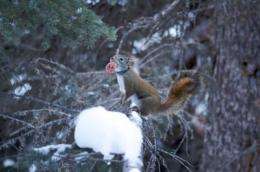Squirrels show softer side by adopting orphans, study finds

Those neighbourhood squirrels you often see fighting over food may not seem altruistic, but new University of Guelph research has found that the critters will actually take in orphaned relatives.
The study by Guelph Prof. Andrew McAdam, along with researchers from the University of Alberta and McGill University, revealed that red squirrels will adopt pups that have lost their mother.
It's a significant finding because while such adoptions are typical among species that live in extended family groups, it's much less common among asocial animals, such as squirrels.
"Social animals, including lions and chimpanzees, are often surrounded by relatives, so it's not surprising that a female would adopt an orphaned family member because they have already spent a lot of time together," said McAdam, an evolutionary biologist. "But red squirrels live in complete isolation and are very territorial. The only time they will allow another squirrel on their territory is the one day a year when the females are ready to mate or when they are nursing their pups."
But the study, published in Nature Communications, also found that squirrels have their altruistic limits. They will adopt only if the orphans are related, and even then it's a rare occurrence.
Over two decades, the research team has come across only five cases of adoption.
"That's five cases out of the thousands of litters that have been born since the project began," said McAdam. "Adoption does happen, but it's rare."
Jamie Gorrell, a PhD candidate at the University of Alberta, identified 34 cases of potential adoption over 20 years. An adoption is possible only if the mother dies and a nearby squirrel is also nursing.
"We discovered relatedness plays a critical role in whether a neighbouring squirrel will adopt or not," said McAdam.
In all five adoption scenarios, the pups were nieces, nephews, siblings or grandchildren to the adoptive mother.
"From an evolutionary perspective, the phenomenon of adoption raises the question of why an animal would adopt in the first place given that it jeopardizes the survival of their own offspring," said McAdam. "Under the right conditions, an animal can propagate more copies of its genes by helping relatives to raise their offspring than by producing offspring of their own. So in some cases it might be a good bet to adopt and accept these costs."
By examining the breeding records of thousands of squirrels over the past 20 years, McAdam was able to calculate the costs of adoption.
"What we found was that squirrels will only adopt an orphaned pup when the costs of adoption are low and when the orphans carry a large percentage of the same genes such as siblings, nieces or nephews rather than more distant relatives."
What's also remarkable is that squirrels are able to assess which pups are related or not, he added.
As squirrels rarely interact, they learn who their nearby relatives are by hearing their unique calls, he said. If they fail to hear a relative's calls for a few days, they may investigate.
"We suspect that, if they find pups on the territory, they remember that their neighbour was a relative and carry the pups back to their nest. This would be quite intelligent behaviour for a squirrel."
Provided by University of Guelph

















